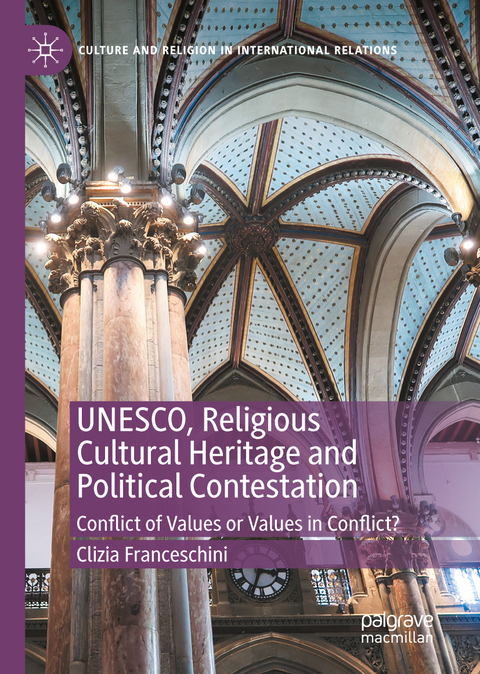
UNESCO, Religious Cultural Heritage and Political Contestation
Springer International Publishing (Verlag)
978-3-031-74571-3 (ISBN)
- Noch nicht erschienen - erscheint am 12.01.2025
- Versandkostenfrei innerhalb Deutschlands
- Auch auf Rechnung
- Verfügbarkeit in der Filiale vor Ort prüfen
- Artikel merken
This book offers an innovative study of UNESCO's religious heritage and nomination mechanisms. In particular, it shows how these processes can easily become instruments of power politics, undermining the neutrality and impartiality of the nomination processes. This is particularly true where political contestation for the exercise of sovereign authority over the site is politically contested and the competing claims are primarily based on shared cultural and religious narratives, which both sides in the dispute use to assert their claims. In this respect, religious heritage, both in its tangible and intangible dimensions, is the subject of national and global decisions that have political, cultural and religious implications. Starting from this premise, the book aims to show that the global regulatory framework and institutional decisions in the field of religious heritage are not neutral, but are determined by political discourses and agendas of governments and UNESCO.
Clizia Franceschini is Adjunct Professor of Administrative Law at the University of Florence and Fellow at the University of Bologna, Campus of Ravenna, Department of Cultural Heritage. As a fellow at the Department of cultural heritage, she is also an academic tutor for the courses of Human Rights Law and Religion and Comparative Ecclesiastical Law. She is also an academic tutor of Cultural Heritage Law.
Chapter 1. What happened with the West's African donor darlings and its 'new leaders'?.- Chapter 2. Elements of continuity: promoting democracy during the Cold War.- Chapter 3. The Embrace.- Chapter 4. The legacies of armed struggles, authoritarianism, ideology and division.- Chapter 5. Western donors and Africa's 'hybrid regimes'.- Chapter 6. Democracy and Civil Rights: securing political closure and Western responses.- Chapter 7. Controlling economic liberalisation.- Chapter 8.The cacophonies and silences of international development frameworks.- Chapter 9.The 'good governance' agenda, with democracy as a side order.- Chapter 10. Downplaying multi-party democracy - the Developmental State, Consultations, Participation and Decentralisation.- Chapter 11. Development assistance and the changing Westernsecurity agenda in Africa.- Chapter 12. African members of the 'Coalition of the Willing'.- Chapter 13. Working the compacts: Western aid and the consolidation of authoritarianism.- Chapter 14. The New Cold War: competing for African allies and democracy promotion.
| Erscheint lt. Verlag | 12.1.2025 |
|---|---|
| Reihe/Serie | Culture and Religion in International Relations |
| Zusatzinfo | Approx. 200 p. |
| Verlagsort | Cham |
| Sprache | englisch |
| Maße | 148 x 210 mm |
| Themenwelt | Geisteswissenschaften ► Religion / Theologie |
| Sozialwissenschaften ► Politik / Verwaltung ► Europäische / Internationale Politik | |
| Sozialwissenschaften ► Politik / Verwaltung ► Vergleichende Politikwissenschaften | |
| Schlagworte | Cultural Narratives • Nomination • Outstanding universal value • political contestation • religious cultural heritage • religious sites • religious values • sovereign authority • UNESCO |
| ISBN-10 | 3-031-74571-X / 303174571X |
| ISBN-13 | 978-3-031-74571-3 / 9783031745713 |
| Zustand | Neuware |
| Haben Sie eine Frage zum Produkt? |
aus dem Bereich


